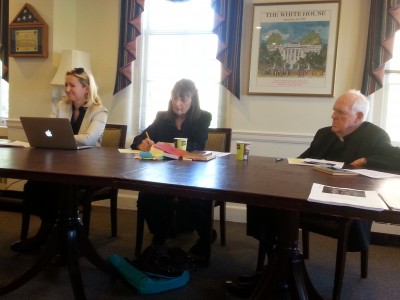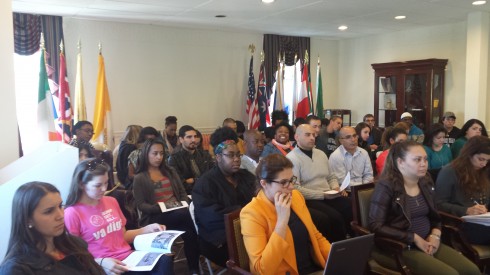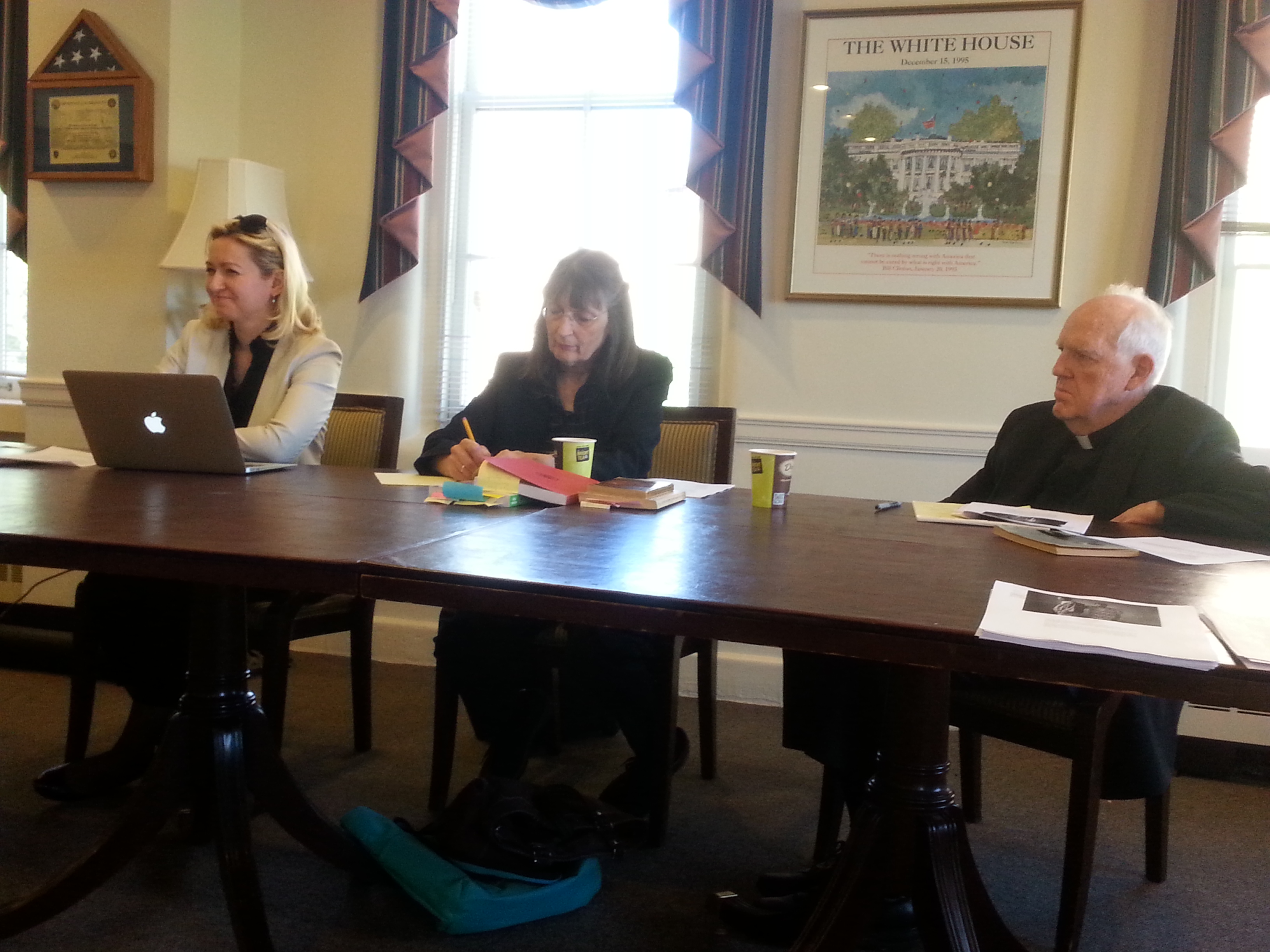 The Love and Forgiveness project team at Seton Hall had a pleasure to host a panel discussion on the topic of forgiveness in different religions with Monsignor Richard Liddy and Dr. Gisela Webb moderated by Dr. Borislava Manojlovic.
The Love and Forgiveness project team at Seton Hall had a pleasure to host a panel discussion on the topic of forgiveness in different religions with Monsignor Richard Liddy and Dr. Gisela Webb moderated by Dr. Borislava Manojlovic.
What is forgiveness? According to Monsignor Liddy: “Forgiveness is a decision to let go of the desire for revenge and ill-will toward the person who wronged you; it is the act of good will. Forgiveness is also a natural resolution of the grief process – a necessary acknowledgment of pain and loss.”
Most world religions include teachings on forgiveness, which provide guidance for the practice of forgiveness. The concept of forgiveness might differ, but it still calls for love and pure heart. Here are some examples of forgiveness understood by different religions.
According to Judaism if a person caused harm, he/she needs to sincerely apologize. Then the wronged person is religiously bound to forgive. However, even without an apology, forgiveness is considered a pious act (Deot 6:9). Teshuva (literally “Returning”) is a way of atoning, which requires cessation of harmful act, regret over act, confession and repentance. Yom Kippur is the Day of Atonement when Jews particularly strive to perform Teshuva.
In Christian teachings forgiveness plays an important role in spiritual life. The Lord’s Prayer best exemplifies this attitude. The final words uttered by Christ on the cross showed the whole world the importance of forgiveness that resonated through time: “Father, forgive them, for they know not what they do.” (Luke 23:34). Jesus has taught us that we should forgive unconditionally, that we should love our enemies and turn the other cheek (Matthew 5:9 & Luke 6:27-31).
 The word Islam is derived from the Semitic word Salem, which means “peace”. In Islam forgiveness is a prerequisite for genuine peace. Forgiveness is held as the better course of action whenever possible describe in a quote from the Qu’ran: “Although the just penalty for an injustice is an equivalent to retribution, those who pardon and maintain righteousness are rewarded by God. He does not love the unjust” (Qur’an 42:40).
The word Islam is derived from the Semitic word Salem, which means “peace”. In Islam forgiveness is a prerequisite for genuine peace. Forgiveness is held as the better course of action whenever possible describe in a quote from the Qu’ran: “Although the just penalty for an injustice is an equivalent to retribution, those who pardon and maintain righteousness are rewarded by God. He does not love the unjust” (Qur’an 42:40).
Monsignor Liddy touched on important aspect of how to start the process of forgiveness. He emphasized dialogue as essential in grasping the reason behind the wrong that was done to us and change from within. Dialogue enables realization of the pain and provides time and space for healing, which leads to forgiveness. In addition, he talked about what influences a person’s capacity to forgive. First, he stressed the degree of hurt or harm caused to the person. Second is the age factor. Third is the personality and temperament. Dr. Webb stressed that our capacity to forgive is also affected by the degree of religious involvement.
Forgiveness has clear, positive effects on human well-being. It is an important aspect of maintaining social order, fostering social relationships, and promoting physical health. Most importantly, forgiveness is liberating for human spirit.


This is wanderful and great as forgiveness is a necessary virtue which humanity must imbibe to develop a saner world. When we fail to forgive, the world becomes unloving and brutal and we will all be the losers. Forgiveness becomes a veritable human attribute cutting across religious divides therefore, forgive or perish.
I am a fourth grade religion teacher and i need some things on forgiveness to teach my grade . Like some literture on it.
I believe forgiveness is for the most benefit for the person forgiving, to let go of anger and hate. Those who feel they need to be forgiven mostly need to learn to forgive themselves first. Being told they are forgiven by others or no longer hated by others is only a secondary salve and doesn’t help as much as we think, if we don’t allow ourselves to forgive ourselves.
I believe in forgiveness for people who are close to the heart. I forgive and ask for forgiveness. In fact I have asked both God above and loved ones for forgiveness. I understand quite well that forgiveness is a 2-way street!
So Basically, Just Repent and turn away and promise never to do it again right? all is forgiven as long as you promise never to do it again? Whatever bow down and kiss the floor and they can bob their head against a wall….I’m gonna go with The Apostle Paul and How Jesus died for my Sins , was Buried and Rose from the dead on the third day according to the Scriptures…..I need the Supernatural Work of the Cross for my Sins..I can’t lie and tell myself and God, I Promise , I wont do it Again.Who am i to say, i will never do it again? I LIKE BEING CONTENT WITH BEING A SINNER and Content in putting no Confidence in the Flesh , No need to Pretend i am more Holy than anyone else, But as my Confidence is in Jesus Christ unto Salvation , I Believe this will make me more Holy than thou. Praise be to He
Forgiveness is nothing to do with religion, we have to learn to forgive ourself to hate. Everything start with us, Unconditional love is way forward.
To add Yes I strongly agree Forgiveness is the key So forgive me if my comments are not agreeable to someone who reads them . By no means am I against any faith The identity associated with a faith is the problem
I find it both enlightening and sad to read about forgiveness Though every faith has it in its teachings many of the followers cannot practice it leading to the world we live in at the moment with violence and revenge and hatred. Solution either each one of us forgets what one is born as ( I am born Hindu) and imbibes all scriptures as their own / I read and I forget what faith it comes from . Or what I call as unbiassed introspectiveness and corrective action – does not require any faith which sometimes creates a bias
It is true that forgiveness is necessary in every religious or spiritual persuits.
https://nexusnovel.wordpress.com/2007/01/03/forgiveness-in-different-religions/
There’s a lot of similarities between this article and the one linked above.
I am happy that such a project as the Love and Forgiveness Project exists. It can only bring positive results to the world. I found you while searching for teachings on Forgiveness for a Baha’i Devotional Meeting which I hosted. I would like to suggest that you make yourselves more visible and also have one more request. Please include Writings from the Baha’i Faith. It is the newest world religion and yet the most widespread in the world. It focuses on the principle of belief in the Oneness of mankind and has brought spiritual and administrative teachings and laws which are designed by Baha’u’llah, Who we consider to be the Manifestation of God for the day in which we are living, to answer the needs and exigencies of today. Please research and include in your project. Thank you so much and I pray for your success in spreading the divine truths which exist in all the world’s religions.
We were lucky to have Msgr. Liddy and Dr. Webb visit the School of Diplomacy to discuss forgiveness and religion. I hope this is just the first of many events that will discuss this topic because it would be nice to add other views to what these to already said.